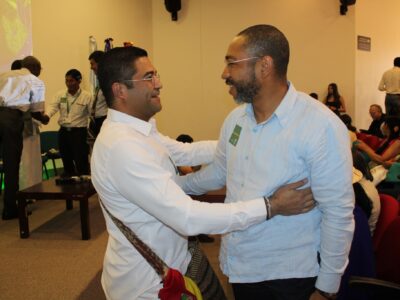
ACDI/VOCA is deeply committed to creating a learning culture for our project teams around the world. We promote Collaborating, Learning, and Adapting (CLA), adaptive management, and evidence-based decision-making across the organization. The backbone of this rigorous CLA structure is our dynamic and capable Monitoring, Evaluation & Learning (MEL) staff including MEL leaders in our home office, experienced regional staff providing tailored project support, and committed project MEL Directors and Management Information Systems (MIS) staff.

In May, ACDI/VOCA facilitated a four-day training conference in Nairobi Kenya attended by more than 58 CLA, MEL, and MIS staff representing 21 ACDI/VOCA and Tanager (an ACDI/VOCA affiliate) projects from 18 countries. Staff shared experiences, innovations, and best practices in CLA, systems change measurement, and advanced applications of ACDI/VOCA’s Learning, Evaluation & Learning Platform (LEAP) 2.0.
For the first plenary session, “Better integration of MEL-MIS-CLA for data-driven decision making and adaptation,” participants created a visual of the behaviors, processes, and practices an ideal project would have in place to support whole-project application of CLA and improved project decision-making. Many shared an appreciation for visuals (arrows and feedback loops) that showcased CLA’s integration and importance across all teams involved in implementation and analysis.

Data-driven communication powered by collaboration
Other CLA-focused presentations further highlighted ACDI/VOCA’s leadership in the use of data beyond simply recording and reporting on required indicators. Akram Ali, CLA and Communications Lead for the USAID-funded Livestock and Nutrition (LAN) project in Bangladesh showcased the novel ways they share and communicate project learning with stakeholders using secondary data (data not reported through required indicators.)

Sharing data, knowledge, and information to get support
The USAID-funded Big Small Businesses Project’s MEL Manager Miodrag Bogdanovic shared his project’s work on the SME Compass Index, an innovative tool created to bridge knowledge, data, and communications gaps that created barriers to government support for the sector, which accounts for over 50 percent of Serbia’s exports.
Tracking and sharing learning for rapid response
During a session on rapid feedback loops, teams shared innovations that allow for collecting and sharing information with other team members for rapid decision-making. For example, Eric Sunu, from the USAID-funded Ghana Market Systems Resilience (MSR) talked about an internal project adaptation tracker that the entire team uses to document learning that incited changes from the original planned interventions or processes. For example, one of MSR’s planned activities was the digitalization of outgrower businesses. During the activity rollout technical staff found data literacy gaps served as a bottleneck, so they documented this learning and added literacy training as a pre-activity.
Accessing, analyzing, and using M&E data in LEAP
ACDI/VOCA’s LEAP 2.0 continues to stand out as one of the few platforms that utilizes a relational database with on- and off-line data collection features, where data feeds directly into PowerBI to create dashboards and visuals. New and more advanced features of the system ACDI/VOCA has systemically coordinated with ActivityInfo and are rolling out based on user feedback. The new, more user-friendly features improve data quality and empower staff to apply time-saving techniques. A session on the use of the open-source programming language R helped teams understand how to use a wide variety of statistical and graphical techniques to manipulate and display their data.

The LEAP system not only collects project-level data but also allows the organization to aggregate and visualize cross-cutting prioritized project indicators aligned with Sustainable Development Goal metrics. Emmanuel Dorman, ACDI/VOCA’s MERL Managing Director shared ways teams can optimize cross-project knowledge to communicate and illustrate aggregated impact across indicators and technical areas.
Measuring systems change
ACDI/VOCA has led the way in systems change measurement, as demonstrated by external knowledge sharing and the application of systems measurement methods in its projects. Conference attendees discussed social network analysis, outcome harvests, outcome mapping, the Most Significant Change method, and social behavior change measurement. Project staff shared real-world examples of how they have applied these measurement methods.
Learning at the partner level
Participants shared their proven techniques for engaging different stakeholder types, including private sector actors, government actors, and non-profits/farmers groups. Staff from the USAID-funded Kuza and Resilience Learning Activities, both implemented in Kenya, spoke about working with government actors in ways that promote learning such as alignment of multi-stakeholder work planning activities and demonstrating the value of learning through activity co-investment.
Creating connections for future collaboration

One of the most valuable outcomes of the conference was the development of new and improved connections across ACDI/VOCA’s MEL and CLA communities of practice, promoting a sense of group identity and trust for enhanced collaboration across the globe. As one participant wrote, “I was not expecting so many appetites to interact, share, brainstorm… Our community of practice is re-dynamized.”
Comments




